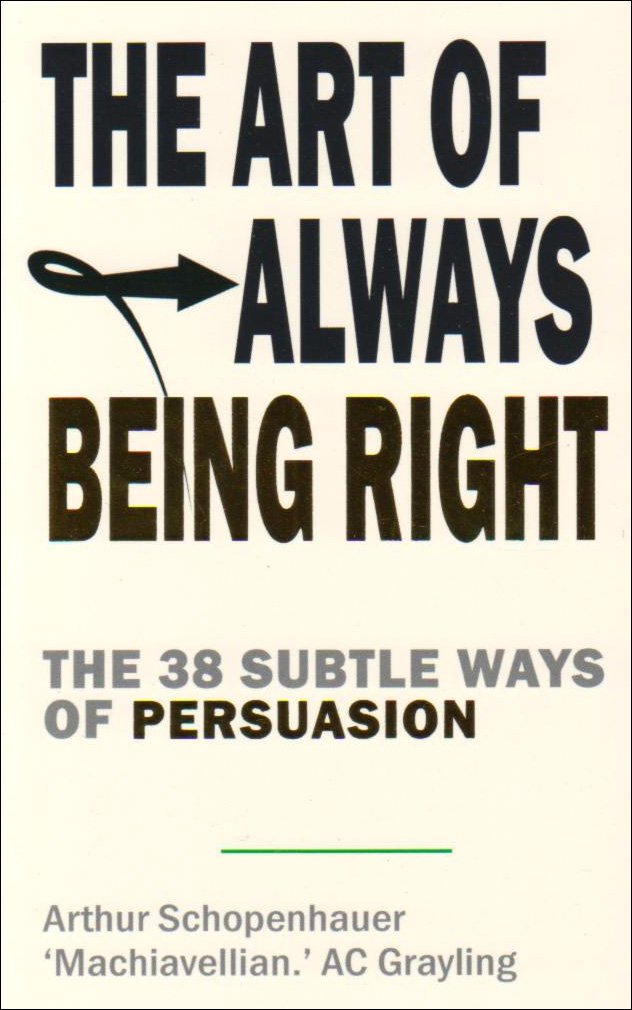
Last week I read Arthur Schopenhauer’s book, ‘The Art Of Always Being Right’. Don’t ask.
I’m still not sure whether it was serious or meant to be funny. That was probably the point.
A good part of the thinking seemed to centre around the idea that it was important to win an argument irrespective of whether you were right or not. In that sense, it feels like it must be compulsory reading for the current crop of self-serving, truth-shy politicians. I’m guessing it plays a big part in the curriculum at places like Eton too.
The book contains ‘the’ thirty-eight ways to guarantee winning your next argument. In a lot of ways the strategies are similar to the ideas found in The Art of War. Not as evocative or well-described, but similar nevertheless. Which in turn means there must be a fair amount of overlap with the TRIZ Inventive Principles. In that an argument – irrespective of whether one or both parties is ‘right’ – is a contradiction, and if it is a contradiction, the only way to ‘solve’ it, according to TRIZ at least, is through one or a combination of the 40 Principles. I thus had my fingers crossed that Schopenhauer might have something to add to the contradiction solving story.
So I went through all of ‘the’ thirty-eight strategies to see if there was the flicker of insight. Some of Schopenhauer’s strategy titles weren’t exactly obvious, so the exercise meant literally reading the whole book. Even when I found myself tutting with frustration. Here are his thirty-eight strategies, so you can see what you think:
Extension
Homonyms
Generalise The Specific
Conceal Your Game
False Premises
Postulate What Has To Be Proven
Yield Admissions Through Questions
Make Your Opponent Angry
Question In Detouring Order
Take Advantage Of The No-Sayer
Generalise Admission Of Specific Cases
Choose Metaphors Favourable To Your Proposition
Agree To Reject Counter-Argument
Claim Victory Despite Defeat
Use Seemingly Absurd Propositions
Use Your Opponent’s Views
Defence Through Subtle Distinction
Interrupt, Break-up, Divert
Generalise The Matter, Then Argue Against It
Draw Conclusions Yourself
Counter With An Argument As Bad As His
Beg The Question (use circular reasoning)
Make Him Exaggerate
State A False Syllogism
Find The Instance To The Contrary
Turn The Tables
Anger Indicates A Weak Point
Persuade The Audience Not The Opponent
Diversion
Appeal To Authority Rather Than Reason
This Is Beyond Me
Put His Thesis Into An Odious Category
It Applies In Theory, But Not In Practice
Don’t Let Him Off The Hook
Will Is More Effective Than Insight
The Vicar Of Wakefield
A Faulty Proof Refutes His Whole Proposition
The Ultimate Strategy (personal insult)
When mapping the full descriptions to the TRIZ Inventive Principle, it rapidly became clear that some of the strategies actually contained several different strategies, or sub-strategies, or combinations of strategies, but lest I come across as trying to build any kind of suspense, all of the variants fitted very clearly into the long-established Principle taxonomy. The eventual score looked like this:

Twenty-five of the TRIZ Principles had a Schopenhauer corollary, leaving fifteen Principles that Schopenhauer never thought of. Assuming the listing is in the chronological order in which Schopenhauer thought of them (I can see no evidence of any other kind of structure), when you learn that Strategy Thirty-Eight – the ‘Ultimate Strategy’ no less – is essentially to shout personal insults at your opponent, I’d have to say that he was getting somewhat desperate towards the end of his analysis. Which I have ultimately taken to be good news. Next time you find yourself on Question Time or in the Question Time audience, if you know some TRIZ you have a fifteen strategy advantage over the Public School educated charlatans on the panel.
Plus, contradiction-wise, you ought to have a far better chance of being right as well as winning.
